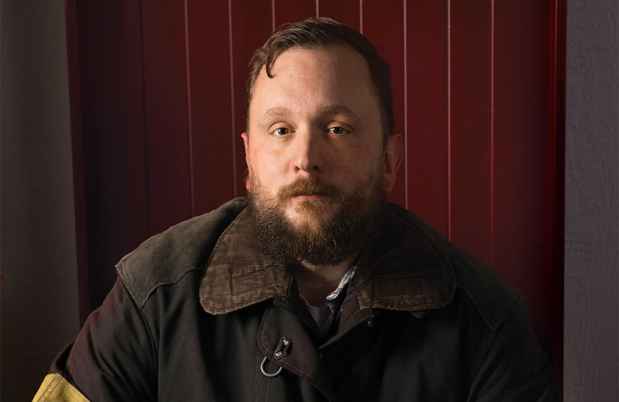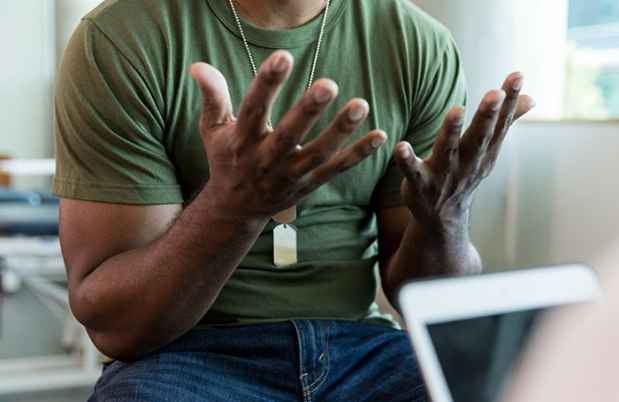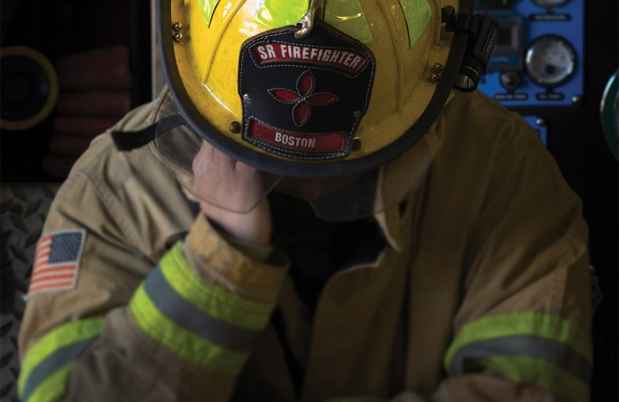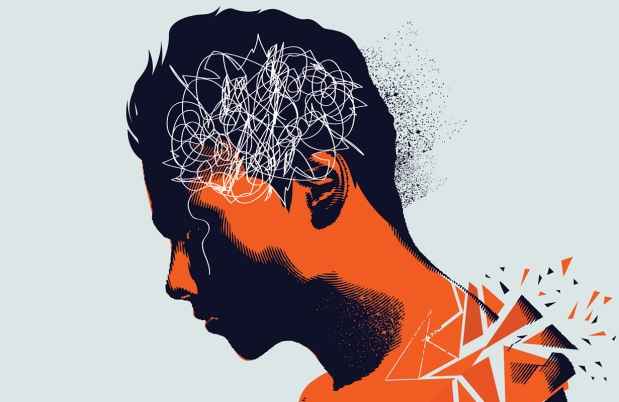LEADER
Specialized Mental Health Services for First Responders
McLean Hospital understands that police, active military and other first responders endure unique on-duty and personal stresses, and also face many obstacles in seeking help.
The LEADER (Law Enforcement, Active Duty, Emergency Responder) program at McLean Hospital is proud to provide specialized mental health and addiction services, designed specifically for men and women in uniform.
Our team of physicians, psychologists, social workers, nurses, and counselors is experienced and expert in working with police, active military and first responders.
We are here for you and your family. For more information or to make a referral, please call 617.855.3141.
“Ordinarily, I would not be receptive to this type of environment, but I was very comfortable with the counselors, other officers, and the way we were treated by the McLean staff.”
– A 20+ year veteran police officer
Treatment Approach
Our goal is to work with you to address your individual needs and to provide the best possible care that will allow you to return to your career, family and community.
In order to provide you with all the resources you need to recover, in a comfortable and safe environment, McLean offers a number of care options, including inpatient, residential, partial hospital and outpatient programs.

LEADER offers specialty mental health services for the unique needs of first responders
LEADER program components:
- Specialized treatment for first responders who need to address issues of trauma, depression and or addiction
- Inpatient treatment for life crisis and substance use disorders, including detox
- Separate residential treatment programs for men and women
- Outpatient programs providing individual and group therapy for men and women
- Afternoon and weekend LEADER therapy groups with topics including: stress management, family impact, resiliency, healthy sleep, as well as medical complications and pain management
- Exclusive access to the LEADER Consultation Team, experts in addressing the unique challenges faced by uniformed men and women
- Priority access to all other McLean mental health specialty programs throughout our campuses
- Specialized AA meetings for members of the law enforcement community
LEADER Can Help You in Times of Distress
For frontline workers, stress springs from the nature of the job itself. In addition, many emergency responders and frontline workers feel compelled to respond to the call to action at the expense of the self. There is a need to remain on the front lines for just a while longer, to ‘tough it out.’
Oftentimes when first responders seek help, they experience guilt when they are in treatment and there is a news report of a negative event in the area they serve. The guilt results in feelings that they are abandoning colleagues during a time of need.
Many have a wish or a need to not leave their fellow first responders to manage without them. This mindset holds even if that is not what will benefit them and their mental health.
The stress of selflessness can be overwhelming. LEADER can help you to manage these feelings to set you on a path toward mental wellness.
“I was diagnosed with catastrophic PTSD. No one could help me. I reluctantly went to McLean and my life is not only the best it’s been since the war, I’ve never felt this good in my entire life. Thank you McLean.”– A combat veteran of the Iraq war and local police officer
Emergency responders often have trouble striking a healthy balance between pressure-filled jobs and their personal lives. Many situations that they encounter on the job are difficult and stressful on a normal day. A crisis like the COVID-19 pandemic is more than ordinarily challenging.
A significant difficulty for first responders is managing their jobs and roles they fill as parents and spouses. Many frontline workers have dramatically changed their work routines during the pandemic. They see their children or family less or stop entirely for a time.
For those who regularly return home from their work shifts, new pressures have emerged. There’s an increased fear of bringing COVID-19 home with them. Many LEADER patients expend a lot of effort attempting to not ‘bring the work home.’ With COVID-19, this fear feels more immediate, with pressing consequences.
Separation from loved ones, alongside fears of bringing the virus home, takes a toll on frontline workers. At LEADER, we see first responders work very hard to maintain confidence and competence in their roles. But when their supports are less accessible, it affects their mental health and ability to cope.
If you are a first responder and are feeling the effects of trauma—COVID-19 related or not—the first step in seeking help may be the most difficult step.
Knowing that you are not alone and that there are treatments available to help build resilience to trauma is important. This is key to your own recovery, but also to help your fellow first responders know that seeking help is perfectly normal.
Admission & Cost
Admission
LEADER offers specialized mental health and addiction services, designed specifically for men and women in uniform.
For more information or to make a referral to LEADER, please contact:
Wendy Currie, MSW, LICSW, Director
Phone: 617.855.3141
Email: [email protected]
Be sure to mention that you are calling about a police officer, active duty National Guard, or other responder.
Cost
McLean accepts Medicare, Massachusetts Medicaid, and many private insurance and managed care plans.
More information on insurance providers accepted by McLean Hospital may be found on the Mass General Brigham website. You may also find it beneficial to review McLean’s patient billing and financial assistance information.
Treatment Team
Program Leadership

Joseph Gold, MD, Associate Chief for Clinical Services
Dr. Gold oversees all of the hospital’s clinical programs across multiple sites, age groups, and levels of care. He serves as the physician leader of McLean’s Schwartz Center Rounds to promote compassionate care giving and support to caregivers. Dr. Gold is also a member of the Executive Committee of the MGH-McLean Child Psychiatry Residency Training Committee.

Wendy Currie, MSW, LICSW, Director, LEADER Continuum of Care
In addition to administrative oversight of the program, Ms. Currie treats LEADER patients in the outpatient clinic. She is passionate about serving this patient population and working as a liaison to various police, fire, and EMS departments, as well as employee assistance programs for first responders. Ms. Currie is also the director of psychiatric admissions at McLean, overseeing inpatient admissions throughout the hospital.
LEADER Men’s Residential Program

Patricia Diaferio, LICSW, Program Director
Ms. Diaferio also works with LEADER patients in the outpatient clinic as well as being a liaison to various police and fire departments’ employee assistance programs for first responders. She has extensive experience working with co-occurring disorders.

Hilary S. Connery, MD, PhD, Medical Director
Dr. Connery is an assistant professor of psychiatry at Harvard Medical School and serves as the clinical director for McLean’s Division of Alcohol, Drugs, and Addiction. Her expertise includes treatment of opioid use disorders and integrated treatments for co-occurring substance use disorders and other mental illnesses.
LEADER Mood, Anxiety, Stress, and Trauma Outpatient Clinic

Tanya Farber, PsyD, Program Director
Dr. Farber provides group and individual therapy to patients in the LEADER outpatient clinic. She also provides consultations to other hospital programs as part of the LEADER trauma consultation service and is involved in the supervision of psychiatry residents at McLean.

Beth L. Murphy, MD, PhD, Medical Director
Dr. Murphy is active in the training of psychiatry residents and in the supervision of nurse practitioners. She serves as a member of the physician liaison team for physicians who are engaged in treatment at McLean. She also participates in trauma-related research at McLean, collaborating with several laboratories.
Staff and Associates
Our multidisciplinary team of clinicians and support staff includes board-certified addiction psychiatrists, licensed psychologists and family therapists, registered nurses, and mental health specialists. Working in close partnership with patients and families, we create and provide high-quality care tailored to each individual’s needs.
This well-trained team has extensive background in the treatment of substance use disorders and co-occurring mental health conditions. Our staff have experience working with patients from diverse cultural and socioeconomic backgrounds from across the country and around the world.






